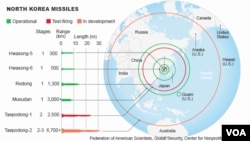North Korea has fired two medium-range missiles into the sea off its east coast, a move Seoul and Washington immediately slammed as a provocation.
South Korea says the suspected Rodong ballistic missiles fired early Wednesday flew about 650 kilometers before landing in the sea between Korea and Japan.
That represents an escalation for Pyongyang, which has test-fired a series of short-range Scud missiles in recent weeks.
Seoul's Defense Ministry spokesman Kim Min-seok called the move a "serious provocation" and noted it was meant to a send a political message.
"North Korea's missile launch this time is a clear violation against United Nations Security Council resolutions," said Kim. "Also, it is a serious provocation against South Korea and the international society. This is in opposition to declarations in favor of North Korea's denuclearization during the Korea-China summit meeting and the Korea-U.S.-Japan summit meeting at the Nuclear Security Summit [in the Netherlands], and in [opposition to] the annual Korea-U.S. joint military drill. It is also showing its capability of firing ballistic missiles."
The U.S. State Department called the launches a "troubling and provocative escalation" and a "clear violation" of U.N. Security Council resolutions against North Korea's ballistic missile program.
It said the North provided no warning beforehand, adding to fears about the safety of commercial airliners and ships passing through the area.
Earlier this month, a North Korean rocket, fired without warning, crossed the trajectory of a Chinese airliner with 200 people on board.
Japan's Chief Cabinet Secretary Yoshihide Suga also expressed concern about the risk posed by the launches.
"We have lodged complaints against North Korea, as this was an extremely problematic action considering the safety of the navigation of flights and ships. It also violates the U.N. Security Council resolution and the Japan-North Korea Pyongyang Declaration," said Suga.
The launch came as leaders of the United States, Japan and South Korea met in the Netherlands, with North Korea's nuclear ambitions high on the agenda of their talks.
Before the meeting started Tuesday, U.S. President Barack Obama said deepening coordination among Washington, Tokyo and Seoul, including “military cooperation that includes joint exercises," is vital to dealing with North Korea.
Tufts University Korean Studies assistant professor Sung-Yong Lee tells VOA that he agrees the Wednesday launches were meant to send a political message.
"North Korea is very good at timing - rubbing it in, adding insult to injury. And this is a way for North Korea to remind the United States and Japan and South Korea that it is a political factor to be reckoned with - that it cannot be ignored," said Sung-Yong Lee.
The launches come after Pyongyang fired 16 short-range Scud rockets into its eastern waters early Sunday, following similar launches of 30 rockets Saturday.
Analysts say the launches are an expression of Pyongyang's anger at ongoing annual South Korean-U.S. military drills, which run until next month. The North routinely criticizes the drills, saying they are rehearsals for an invasion.
North Korea has defended its short-range missile launches as routine tests. It has not commented on the latest medium-range launches.
South Korea says the suspected Rodong ballistic missiles fired early Wednesday flew about 650 kilometers before landing in the sea between Korea and Japan.
That represents an escalation for Pyongyang, which has test-fired a series of short-range Scud missiles in recent weeks.
Seoul's Defense Ministry spokesman Kim Min-seok called the move a "serious provocation" and noted it was meant to a send a political message.
"North Korea's missile launch this time is a clear violation against United Nations Security Council resolutions," said Kim. "Also, it is a serious provocation against South Korea and the international society. This is in opposition to declarations in favor of North Korea's denuclearization during the Korea-China summit meeting and the Korea-U.S.-Japan summit meeting at the Nuclear Security Summit [in the Netherlands], and in [opposition to] the annual Korea-U.S. joint military drill. It is also showing its capability of firing ballistic missiles."
The U.S. State Department called the launches a "troubling and provocative escalation" and a "clear violation" of U.N. Security Council resolutions against North Korea's ballistic missile program.
It said the North provided no warning beforehand, adding to fears about the safety of commercial airliners and ships passing through the area.
Earlier this month, a North Korean rocket, fired without warning, crossed the trajectory of a Chinese airliner with 200 people on board.
Japan's Chief Cabinet Secretary Yoshihide Suga also expressed concern about the risk posed by the launches.
"We have lodged complaints against North Korea, as this was an extremely problematic action considering the safety of the navigation of flights and ships. It also violates the U.N. Security Council resolution and the Japan-North Korea Pyongyang Declaration," said Suga.
The launch came as leaders of the United States, Japan and South Korea met in the Netherlands, with North Korea's nuclear ambitions high on the agenda of their talks.
Before the meeting started Tuesday, U.S. President Barack Obama said deepening coordination among Washington, Tokyo and Seoul, including “military cooperation that includes joint exercises," is vital to dealing with North Korea.
Tufts University Korean Studies assistant professor Sung-Yong Lee tells VOA that he agrees the Wednesday launches were meant to send a political message.
"North Korea is very good at timing - rubbing it in, adding insult to injury. And this is a way for North Korea to remind the United States and Japan and South Korea that it is a political factor to be reckoned with - that it cannot be ignored," said Sung-Yong Lee.
The launches come after Pyongyang fired 16 short-range Scud rockets into its eastern waters early Sunday, following similar launches of 30 rockets Saturday.
Analysts say the launches are an expression of Pyongyang's anger at ongoing annual South Korean-U.S. military drills, which run until next month. The North routinely criticizes the drills, saying they are rehearsals for an invasion.
North Korea has defended its short-range missile launches as routine tests. It has not commented on the latest medium-range launches.





